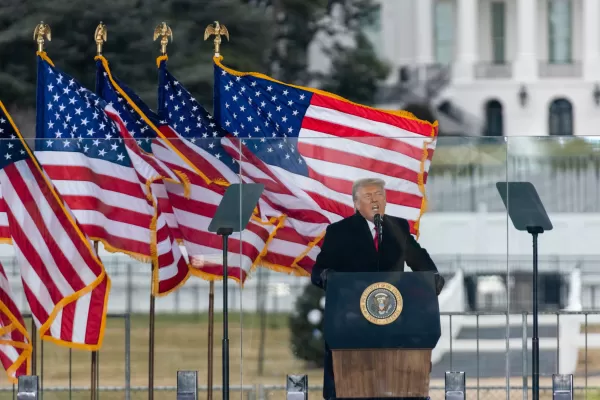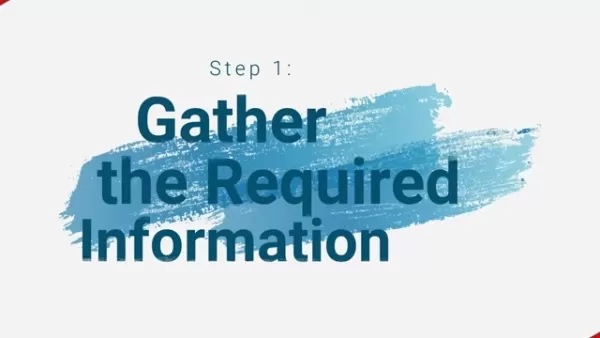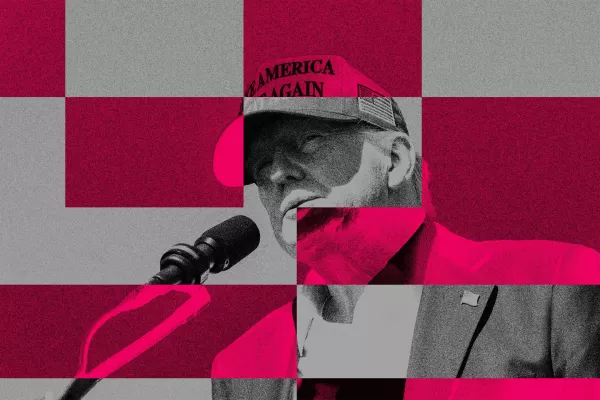Trump Targets Biden and Obama Cybersecurity Policies in New Move

Trump Rolls Back Obama, Biden Cybersecurity Policies in New Executive Order
President Donald Trump signed an executive order on Friday dismantling key cybersecurity policies established by former Presidents Barack Obama and Joe Biden, framing the move as a necessary shift away from what his administration calls "problematic" and "burdensome" regulations.
Key Changes in Trump’s Cybersecurity Order
1. Reversal of Biden’s Digital ID Push
One of the most contentious changes involves scrapping Biden’s Executive Order 14144, which encouraged federal agencies to consider accepting digital identity documents for public benefit programs. The Trump administration argues this policy could enable "widespread abuse by illegal immigrants" seeking access to government assistance.
However, cybersecurity experts like Mark Montgomery of the Foundation for Defense of Democracies criticized the move, telling Politico that the decision "prioritizes questionable immigration concerns over proven cybersecurity benefits."
2. AI Security Requirements Scrapped
Trump’s order also eliminates Biden-era mandates on AI-driven cybersecurity, including:
- Testing AI for energy infrastructure defense
- Funding federal research into AI security
- Directing the Pentagon to use AI models for cyber defense
The White House defended these changes, stating that its new approach focuses on "identifying and managing vulnerabilities, rather than censorship." This aligns with Trump’s allies in Silicon Valley, who have long warned about AI being used for "censorship"—a frequent talking point in conservative tech circles.
3. Weaker Encryption & Contractor Security Rules
The order also removes:
- Quantum-resistant encryption requirements (previously set to take effect "as soon as practicable")
- Federal contractor security attestations, which the White House dismissed as "unproven and burdensome compliance checklists"
Critics argue that these rollbacks weaken defenses against next-generation cyber threats, but the administration insists they eliminate red tape that stifles innovation.
4. Sanctions Policy Shift
Going further back, Trump’s order repeals Obama-era sanctions policies for cyberattacks on the U.S., now limiting sanctions to "foreign malicious actors." The White House claims this prevents "misuse against domestic political opponents" and clarifies that sanctions do not apply to election-related activities.
TechCrunch Event: Save $200+ on All Stage Pass
Build smarter. Scale faster. Connect deeper. Join industry leaders from Precursor Ventures, NEA, Index Ventures, Underscore VC, and more for a day of strategies, workshops, and networking.
📍 Boston, MA | July 15
🔗 REGISTER NOW
Final Take:
Trump’s executive order marks a sharp reversal of previous administrations’ cybersecurity strategies, emphasizing deregulation and political concerns over what experts argue are critical security measures. Whether this shift strengthens or weakens U.S. cyber defenses remains a heated debate.
Related article
 Master Emerald Kaizo Nuzlocke: Ultimate Survival & Strategy Guide
Emerald Kaizo stands as one of the most formidable Pokémon ROM hacks ever conceived. While attempting a Nuzlocke run exponentially increases the challenge, victory remains achievable through meticulous planning and strategic execution. This definitiv
Master Emerald Kaizo Nuzlocke: Ultimate Survival & Strategy Guide
Emerald Kaizo stands as one of the most formidable Pokémon ROM hacks ever conceived. While attempting a Nuzlocke run exponentially increases the challenge, victory remains achievable through meticulous planning and strategic execution. This definitiv
 AI-Powered Cover Letters: Expert Guide for Journal Submissions
In today's competitive academic publishing environment, crafting an effective cover letter can make the crucial difference in your manuscript's acceptance. Discover how AI-powered tools like ChatGPT can streamline this essential task, helping you cre
AI-Powered Cover Letters: Expert Guide for Journal Submissions
In today's competitive academic publishing environment, crafting an effective cover letter can make the crucial difference in your manuscript's acceptance. Discover how AI-powered tools like ChatGPT can streamline this essential task, helping you cre
 US to Sanction Foreign Officials Over Social Media Regulations
US Takes Stand Against Global Digital Content Regulations
The State Department issued a sharp diplomatic rebuke this week targeting European digital governance policies, signaling escalating tensions over control of online platforms. Secretary Marco
Comments (5)
0/200
US to Sanction Foreign Officials Over Social Media Regulations
US Takes Stand Against Global Digital Content Regulations
The State Department issued a sharp diplomatic rebuke this week targeting European digital governance policies, signaling escalating tensions over control of online platforms. Secretary Marco
Comments (5)
0/200
![JuanAdams]() JuanAdams
JuanAdams
 September 22, 2025 at 8:30:30 AM EDT
September 22, 2025 at 8:30:30 AM EDT
C'est dingue comment chaque président démolit les initiatives du précédent... Comme si la cybersécurité était un jeu politique et non une nécessité nationale 🙄 Ça donne juste l'impression qu'ils se battent pour des clous pendant que nos données fuient de partout.


 0
0
![AlbertRodriguez]() AlbertRodriguez
AlbertRodriguez
 September 16, 2025 at 2:30:31 PM EDT
September 16, 2025 at 2:30:31 PM EDT
Finalmente alguém preocupado com a burocracia exagerada na segurança digital! Mas será que essa mudança brusca não vai criar mais vulnerabilidades? 🤔 Torço para que saibam o que estão fazendo...


 0
0
![HenryLopez]() HenryLopez
HenryLopez
 August 13, 2025 at 9:00:59 AM EDT
August 13, 2025 at 9:00:59 AM EDT
這篇文章真讓我大開眼界!川普居然直接推翻了歐巴馬和拜登的網路安全政策,感覺像是在重新洗牌!不過我有點擔心,這種大動作會不會讓網路安全變得更亂?希望新政策能真的有效,而不是只是政治秀😓


 0
0
![JoseGonzalez]() JoseGonzalez
JoseGonzalez
 July 30, 2025 at 9:41:20 PM EDT
July 30, 2025 at 9:41:20 PM EDT
Trump's shaking things up again, huh? Scrapping Obama and Biden's cybersecurity policies feels bold, but is it reckless? Curious to see how this plays out in today’s wild tech world! 🤔


 0
0
![ThomasJones]() ThomasJones
ThomasJones
 July 27, 2025 at 9:19:05 PM EDT
July 27, 2025 at 9:19:05 PM EDT
Trump's shaking things up again! Scrapping Obama and Biden's cybersecurity policies feels bold, but is it reckless? I wonder if this will make us safer or just stir the pot. 🧐


 0
0

Trump Rolls Back Obama, Biden Cybersecurity Policies in New Executive Order
President Donald Trump signed an executive order on Friday dismantling key cybersecurity policies established by former Presidents Barack Obama and Joe Biden, framing the move as a necessary shift away from what his administration calls "problematic" and "burdensome" regulations.
Key Changes in Trump’s Cybersecurity Order
1. Reversal of Biden’s Digital ID Push
One of the most contentious changes involves scrapping Biden’s Executive Order 14144, which encouraged federal agencies to consider accepting digital identity documents for public benefit programs. The Trump administration argues this policy could enable "widespread abuse by illegal immigrants" seeking access to government assistance.
However, cybersecurity experts like Mark Montgomery of the Foundation for Defense of Democracies criticized the move, telling Politico that the decision "prioritizes questionable immigration concerns over proven cybersecurity benefits."
2. AI Security Requirements Scrapped
Trump’s order also eliminates Biden-era mandates on AI-driven cybersecurity, including:
- Testing AI for energy infrastructure defense
- Funding federal research into AI security
- Directing the Pentagon to use AI models for cyber defense
The White House defended these changes, stating that its new approach focuses on "identifying and managing vulnerabilities, rather than censorship." This aligns with Trump’s allies in Silicon Valley, who have long warned about AI being used for "censorship"—a frequent talking point in conservative tech circles.
3. Weaker Encryption & Contractor Security Rules
The order also removes:
- Quantum-resistant encryption requirements (previously set to take effect "as soon as practicable")
- Federal contractor security attestations, which the White House dismissed as "unproven and burdensome compliance checklists"
Critics argue that these rollbacks weaken defenses against next-generation cyber threats, but the administration insists they eliminate red tape that stifles innovation.
4. Sanctions Policy Shift
Going further back, Trump’s order repeals Obama-era sanctions policies for cyberattacks on the U.S., now limiting sanctions to "foreign malicious actors." The White House claims this prevents "misuse against domestic political opponents" and clarifies that sanctions do not apply to election-related activities.
TechCrunch Event: Save $200+ on All Stage Pass
Build smarter. Scale faster. Connect deeper. Join industry leaders from Precursor Ventures, NEA, Index Ventures, Underscore VC, and more for a day of strategies, workshops, and networking.
📍 Boston, MA | July 15
🔗 REGISTER NOW
Final Take:
Trump’s executive order marks a sharp reversal of previous administrations’ cybersecurity strategies, emphasizing deregulation and political concerns over what experts argue are critical security measures. Whether this shift strengthens or weakens U.S. cyber defenses remains a heated debate.
 Master Emerald Kaizo Nuzlocke: Ultimate Survival & Strategy Guide
Emerald Kaizo stands as one of the most formidable Pokémon ROM hacks ever conceived. While attempting a Nuzlocke run exponentially increases the challenge, victory remains achievable through meticulous planning and strategic execution. This definitiv
Master Emerald Kaizo Nuzlocke: Ultimate Survival & Strategy Guide
Emerald Kaizo stands as one of the most formidable Pokémon ROM hacks ever conceived. While attempting a Nuzlocke run exponentially increases the challenge, victory remains achievable through meticulous planning and strategic execution. This definitiv
 AI-Powered Cover Letters: Expert Guide for Journal Submissions
In today's competitive academic publishing environment, crafting an effective cover letter can make the crucial difference in your manuscript's acceptance. Discover how AI-powered tools like ChatGPT can streamline this essential task, helping you cre
AI-Powered Cover Letters: Expert Guide for Journal Submissions
In today's competitive academic publishing environment, crafting an effective cover letter can make the crucial difference in your manuscript's acceptance. Discover how AI-powered tools like ChatGPT can streamline this essential task, helping you cre
 US to Sanction Foreign Officials Over Social Media Regulations
US Takes Stand Against Global Digital Content Regulations
The State Department issued a sharp diplomatic rebuke this week targeting European digital governance policies, signaling escalating tensions over control of online platforms. Secretary Marco
US to Sanction Foreign Officials Over Social Media Regulations
US Takes Stand Against Global Digital Content Regulations
The State Department issued a sharp diplomatic rebuke this week targeting European digital governance policies, signaling escalating tensions over control of online platforms. Secretary Marco
 September 22, 2025 at 8:30:30 AM EDT
September 22, 2025 at 8:30:30 AM EDT
C'est dingue comment chaque président démolit les initiatives du précédent... Comme si la cybersécurité était un jeu politique et non une nécessité nationale 🙄 Ça donne juste l'impression qu'ils se battent pour des clous pendant que nos données fuient de partout.


 0
0
 September 16, 2025 at 2:30:31 PM EDT
September 16, 2025 at 2:30:31 PM EDT
Finalmente alguém preocupado com a burocracia exagerada na segurança digital! Mas será que essa mudança brusca não vai criar mais vulnerabilidades? 🤔 Torço para que saibam o que estão fazendo...


 0
0
 August 13, 2025 at 9:00:59 AM EDT
August 13, 2025 at 9:00:59 AM EDT
這篇文章真讓我大開眼界!川普居然直接推翻了歐巴馬和拜登的網路安全政策,感覺像是在重新洗牌!不過我有點擔心,這種大動作會不會讓網路安全變得更亂?希望新政策能真的有效,而不是只是政治秀😓


 0
0
 July 30, 2025 at 9:41:20 PM EDT
July 30, 2025 at 9:41:20 PM EDT
Trump's shaking things up again, huh? Scrapping Obama and Biden's cybersecurity policies feels bold, but is it reckless? Curious to see how this plays out in today’s wild tech world! 🤔


 0
0
 July 27, 2025 at 9:19:05 PM EDT
July 27, 2025 at 9:19:05 PM EDT
Trump's shaking things up again! Scrapping Obama and Biden's cybersecurity policies feels bold, but is it reckless? I wonder if this will make us safer or just stir the pot. 🧐


 0
0





























